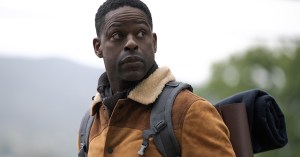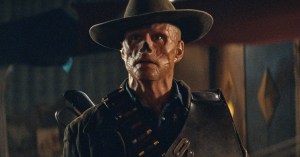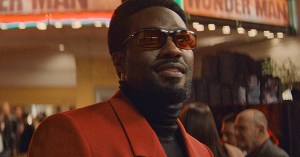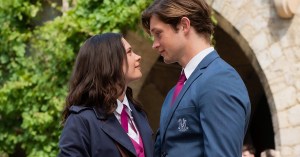5 Big Questions About the Legion Series Finale, Answered
Super-mutant David Haller is a dubious sort of hero. What do his actions mean for his father Charles Xavier and the X-Men?

(Photo by FX)
Since its debut three years ago, FX’s Legion has been one of the most compelling, mind-bending, and uniquely heartfelt series to spin out of a comic book. That it focused on a relatively minor character from the X-Men lore is even more remarkable. But by lifting David Haller from the pages of various X-Men titles into a weird and timeless television reality, show creator Noah Hawley was able to examine topics like mental illness, sexual assault, and the end of the world in a unique way.
Often, it chose not to connect the dots, leaving that mutant ability for the viewer to use. In its place, it offered musical numbers, a couple of fantastic dance numbers, and David – as played by Dan Stevens – unraveling at least some of the secrets buried in his head. And it all led to a pivotal figure in X-Men history, Charles Xavier (Harry Lloyd), and a somewhat obscure, but vitally important background character, Amahl Farouk (Navid Negahban).
Spoiler alert: This article includes plot details from the series finale of Legion. Stop here if you have not watched the final episode.
Considering Charles and Amahl’s fight in the comics led to the formation of the X-Men, it would seem the end of Legion contains a beginning — or maybe it really ended with David destroying the world. Let’s take a look at what the ending has to offer. Negahban was kind enough to talk to Rotten Tomatoes about one of the ways the future could change — well, provided there is a future, of course.
Why did Everyone Think David Would Destroy the World?

(Photo by Pari Dukovic/FX)
He’s done it before.
There is a certain ambiguity in the show’s final shot — or limitless potential as it is a baby’s smiling face. But David’s role in bringing about an apocalypse is probably the third line on his Official Handbook to the Marvel Universe page after “Professor X’s son” and “Suffers from a mental illness.” Despite being a presence in the comic books for a number of years, Legion’s big moment came in 1995’s “Legion Quest” story line. The character – waking from a long coma – made a key decision: he was going to travel back to the 1960s and kill Magneto before he formed his Brotherhood. If successful, then only his father’s non-violent philosophy would hold sway and prevent much of the strife done by Erik Magnus Lehnsherr and his followers.
Unfortunately, it all went badly and Legion ended up killing Charles Xavier instead of Magneto, unleashing a reality in which the world learned about Mutants decades too soon and Apocalypse, a powerful, ancient, and immortal mutant took control of the planet. Eventually, a team of familiar faces (led by the time-lost mutant Bishop) managed to travel back in time to prevent David’s error.
Curiously enough, Bishop was able to show David the damage he caused. The troubled mutant apologized and apparently died.
The Age of Apocalypse was undone and things went back to normal. Well, mostly, anyway. Blink, a fan favorite from the AoA timeline, eventually found herself crossing the multiverse with a group known as “The Exiles,” while Dark Beast, a mad-scientist version of founding X-Man Hank McCoy, and a few other characters found their way to the familiar Earth-616.

(Photo by Suzanne Tenner/FX)
Legion eventually reappeared (as no one stays dead in comics), but his most famous misadventure was always in Hawley’s mind, and a version of “Legion Quest” was the direction of the series from the first moment David flashed his wicked smile into camera.
As Stevens put it when we talked to him on the set back in March, the show is not “directly adapting frame by frame any particular Legion story line. But I hope what we’re retaining is the playfulness.”
Changing reality, if not destroying it, is always an aspect of the playfulness.
Did David End the World?
In a manner of speaking, yes. As his addition to Lessons in Time Travel indicated, the traveler is annihilated in the attempt to change his or her past. The David, Syd (Rachel Keller), Cary and Kerry Loudermilk (Bill Irwin and Amber Midthunder), and Amahl Farouk of the program’s “present” timeline all ceased to exist, as did anyone left there while the Time Eaters munched away. From their perspectives, David ended the world by traveling 33 years into the past — à la “Legion Quest.”
Now, had a fourth season occurred, it is entirely possible we would’ve seen new versions of these characters grappling with echoes from the world before. Much like the way the omnipresent baseline at David’s cult compound invaded the minds of his parents, an image or song (likely from The Who) might have offered Syd or David some clue to the old timeline – much as Bishop survived in the Age of Apocalypse to form his own strike team. Maybe this is why the mainframe version of Ptonomy (Jeremie Harris) remained in stasis back in the present.
But with Chapter 27 serving as the conclusion, we’re left with a blank slate. It is easy to consider what it might look like. We will even be charitable and assume the timeline we witnessed on Legion was a darker world where mutants mostly ran scared and had no unifying groups to help them with their powers.
Will Charles Form the X-Men?
Almost certainly. Upon his return from Morocco, Charles tells Gabrielle (Stephanie Corneliussen) that he always wanted to be a teacher. The implication is clear. Even their home has a certain X-Mansion flare to it. And that change is key in appreciating the series’ end-state. In the personal sense, Charles and Stephanie will be there to raise David — and help him cope with the mental health issues he inherited from Gabrielle. But in the larger sense, Charles came away from his journey with a new perspective. As Lloyd noted when we talked to him in March, “[Charles] is actually quite lost” when he arrives at the Shadow King’s palace. But having returned from a trip that saw him disappear entirely in the old timeline, he is now free to fulfill a destiny he never knew he had.
Back in the comics, Professor X’s battle with the Shadow King led him to found the X-Men as a safe-guard against mutants who use their abilities for evil. But in Legion‘s history, the battle seemingly left Charles dead or utterly incapacitated. Altering this outcome may be more significant than David could imagine. Besides giving Charles the opportunity to be part of the a family unit with Gabrielle and David, he will also be able to teach others how to harness their gifts — no doubt after training David — leading to a very different world.

(Photo by Suzanne Tenner/FX)
We’re also going to note the total absence of Magneto from Legion’s structure as it means TV show David achieved what comic book Legion sought to accomplish: a world in which Charles made things better.
Sure, Division 3 will likely observe the Xavier school, perhaps even come into conflict with a group of X-Men, just as they hunted people at Summerland. Nonetheless, Charles will offer something better than the Birds sought to create. Although, if you’ve read an X-Men comic or seen one of the movies, you know the tension between mutant and humans will always lead to fighting and giant robots. But at least Charles’s attempts with the school and the X-Men offer people like Syd and the Loudermilks something they may not have otherwise: family from an early age.
Who Will the Shadow King Be in the New Future?
When we spoke with Negahban recently, his thoughts turned toward the key moment in the finale: a handshake between David and the Shadow King. It evolved on set, but reflected the overall tone of the final moments. That is to say, a non-violent resolution after all the pain and trauma.
“[Noah] was addressing how people are struggling to see each other, to understand each other, to find themselves,” Negahban explained, adding that some of Amahl’s apparent villainy in Chapter 26 may have been an expression of an extreme loneliness. “Even in his most evil moments, he is feeling very lonely being the most evil person.”
But as Negahban saw it, the Shadow King’s future self gave him something key — an external awareness of his actions.
“The way that I looked at it is that we can change the future by paying attention to our present or paying attention to what we are doing, how we are responding to other people,” the actor said.

(Photo by Matthias Clamer/FX)
For Amahl, that change came courtesy of the future Shadow King’s stylish glasses and the history they contained: “When [he] hands the glasses to Amahl — just by seeing what kind of impact we have on our future, we might change our behavior today.”
Negahban imagines the Amahl who emerges in the new reality will be less lonely and offer his powers to a life of service.
“Sometimes we are becoming so full of ourselves, we are becoming so arrogant that we think that we are controlling everything, that we are controlling the situation,” he said of Amahl up until the events of Chapter 27. “I think Amahl sees the effect that he’s going to have on the future. And at the end when he is thanking [David, Charles, and his future self] for allowing him to see the outcome of his actions, he is getting a second chance to change.”
That apology echoes David’s back in “Age of Apocalypse.” And while it is easy to imagine a kinder Amahl Farouk finding peace in a new future, did David also earn a second chance?
Was David Deserving of His Redemption?
When we visited the set, we asked the cast if David deserved redemption. Midthunder, on the eve of shooting the final episode, still felt conflicted about David.
“Everybody has a story and everybody has a side,” she said. “Everybody has reasons for doing what they do, but then everybody has the way that it affects them.”
Meanwhile, she thought Kerry had a clearer point of view on the matter: he deserved to pay for his actions.
Irwin, on the other hand, thought “that his service to the world — keeping the world going — is something we can all be grateful to him for” even if his actions left him as a dubious sort of hero.
Lauren Tsai, whose character, Switch, allowed David the opportunity to change his past, thought the overall story of season 3 created enough ambiguity for viewers to question his redemption long after the finale.
“I think that throughout the story you can believe that David is redeemable,” she said. “David deserves love and a normal life. But at the same time you can also feel like, Well, he did these horrible things.”

(Photo by Pari Dukovic/FX)
In Switch’s case, David’s exploitation of her powers led to a beneficial transformation. But David’s violation of Syd may be the greatest reason to deny him redemption. Even before he erased her memories of his darkest actions, he was causing her psychic damage.
“So much of her life since she’s met this man has been in service to him,” Keller said during our set visit. “So many young women go through taking on egotistical and stupid and sick men, trying to right their wrongs or fix them.”
This seemed to be an involuntary course of action for Syd up until the end. In March, Keller expressed a hope that Syd would be able to leave him in peace. But it seems time travel allowed her something better: the chance to protect a David brimming with potential. The David she knew deserved only oblivion, even if he did fix the world. That baby, though, definitely deserved better.
And, hopefully, the end of the world (as Legion viewers knew it) will give him that chance.







